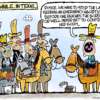One candidate assures voters he’ll make Colorado Springs “the same kind of place, but better.” The other promises a “city on a hill.”
Both, however, want to stop it from becoming “the next Denver.”
Each of Colorado’s three largest cities will elect a mayor in 2023. And while many eyes in state politics are turned to a June 6 contest to decide who will take office in the shadow of the Capitol in Denver, the first big mayoral race of the year — and perhaps the most interesting — is already underway an hour’s drive south in Colorado Springs.
Voters there have already received their ballots for a May 16 runoff that pits Wayne Williams, a City Council member and a longtime fixture in Colorado Republican politics, against first-time candidate Yemi Mobolade, a small business owner and former economic development executive for the city.
Mobolade, who is politically unaffiliated, turned heads with his first-place finish in the first round of mayoral voting last month, capturing 30% of the vote in a field of 12 candidates. Though municipal elections in Colorado Springs are officially nonpartisan, it’s been at least 45 years since the city elected a mayor who wasn’t affiliated with the GOP.
A Nigerian immigrant, Mobolade would also be the first Black candidate to be elected mayor of Colorado Springs. (Leon Young, a longtime City Council member and leader of the city’s Black community, served as interim mayor for several months in 1997.)
In a debate hosted Monday night by Colorado Springs TV station KRDO, Williams touted his record in state and local politics and “executive experience,” while Mobolade delivered a classic outsider’s pitch.
“I’m not a politician,” he said. “And that is precisely what makes me qualified for the job.”
Colorado’s blue wave
A Mobolade victory would be a tectonic shift for politics in Colorado’s second-largest city, and one of its last large Republican strongholds — and his place in the runoff is already a sign of how much things have changed.
Over the last decade, voters in suburban and exurban communities along the Front Range have driven the state’s dramatic shift towards Democratic control, turning key swing districts in metro Denver solidly blue and threatening to make traditionally deep-red counties the next battlegrounds.
As recently as 2014, former Democratic Gov. John Hickenlooper, in his successful bid for reelection, suffered a nearly 30-point defeat among voters in El Paso County, which by then had become Colorado’s largest county by population. But amid continued growth, those margins have steadily grown smaller. Gov. Jared Polis lost by 17 percentage points in El Paso County in 2018, then shrank that margin to just under 4% as he secured a second term last November.
And though Polis came up short of turning El Paso blue, he did succeed in defeating GOP challenger Heidi Ganahl among voters in Colorado Springs, according to precinct-level results from the Colorado secretary of state’s office — becoming the first Democrat to do so in living memory.
Still, Mobolade could face an uphill battle in an off-year election, when the electorate typically skews older and more conservative. He’ll also have to overcome a fundraising disadvantage: Williams, a former Colorado secretary of state, has received nearly $1 million in campaign contributions, much of it from dark-money groups and development interests, compared to Mobolade’s $596,400.
Williams’ campaign has funded ads blasting his opponent as “too liberal for Colorado Springs,” while at Monday’s debate he criticized Mobolade for saying “that he supported equitable outcomes.”
“He also said that he believes there’s a constitutional right for collective bargaining,” Williams said. “That’s not in the U.S. Constitution that I’ve read.”
Mobolade denied supporting unionization for city employees, saying that a yes-or-no question at a candidate forum led to a misunderstanding.
“A good mayor, when he supports his team members, then there’s no need for a union or collective bargaining conversation,” he said.
“Those ads are lies,” Mobolade said of Williams’ negative advertising. “Those ads are what it looks like when you feel like you’re losing, and you have to use fear to try to win.”
On the heels of the Colorado Springs mayoral runoff on May 16, Denver voters will choose between former state Sen. Mike Johnston and former Denver Metro Chamber of Commerce head Kelly Brough in a mayoral runoff of their own. And the city of Aurora, Colorado’s third-largest municipality, will elect a mayor and five City Council members in November, two years after Republicans led by incumbent Mayor Mike Coffman, a former congressman, captured the council majority.
Crime, homelessness issues
Both candidates struck similar tones on issues of crime and homelessness, promising to help the Colorado Springs Police Department recruit and retain more officers. Williams, arguing that the homelessness crisis is driven in part by people “who choose that as a lifestyle,” touted anti-homeless policie like the city’s camping ban and its “sit-lie ordinance,” which prohibits people from sitting or reclining on sidewalks.
Mobolade said that mental health issues are the primary cause of homelessness and that the city should pair “long-term housing with long-term care.”
“I have compassion, but as a parent of young kids, it’s imperative that the public safety of my family is important,” Mobolade said. “As mayor, I will prioritize both.”
“Mr. Williams will tell you that electing anybody but him will turn our city into the next Denver,” he added. “Friends, I hate to break it to you, but we’re already on that track.”
Voters in Colorado Springs have until 7 p.m. on May 16 to return their ballots via mail or drop box, or vote in-person at a polling place.
In his closing message to voters, Williams boasted of the “tremendous progress” the city has made during his time on City Council and said he would follow through on that progress as mayor.
“Colorado Springs will be the same kind of place, but better,” he said. “It will be a place that we want to call home, where we can feel safe, where we’re able to have a good economic way of life. And that progress will continue throughout the community.”
Mobolade promised to put “the interests of our residents ahead of special interests,” and said that “great leadership” can take the city to another level.
“My vision for our city,” he said, “is that we become an inclusive, culturally rich, economically prosperous, safe and vibrant city on a hill that shines brightly.”
This article first appeared in Colorado Newsline, which is part of States Newsroom, a network of news bureaus supported by grants and a coalition of donors as a 501c(3) public charity. Colorado Newsline maintains editorial independence.





